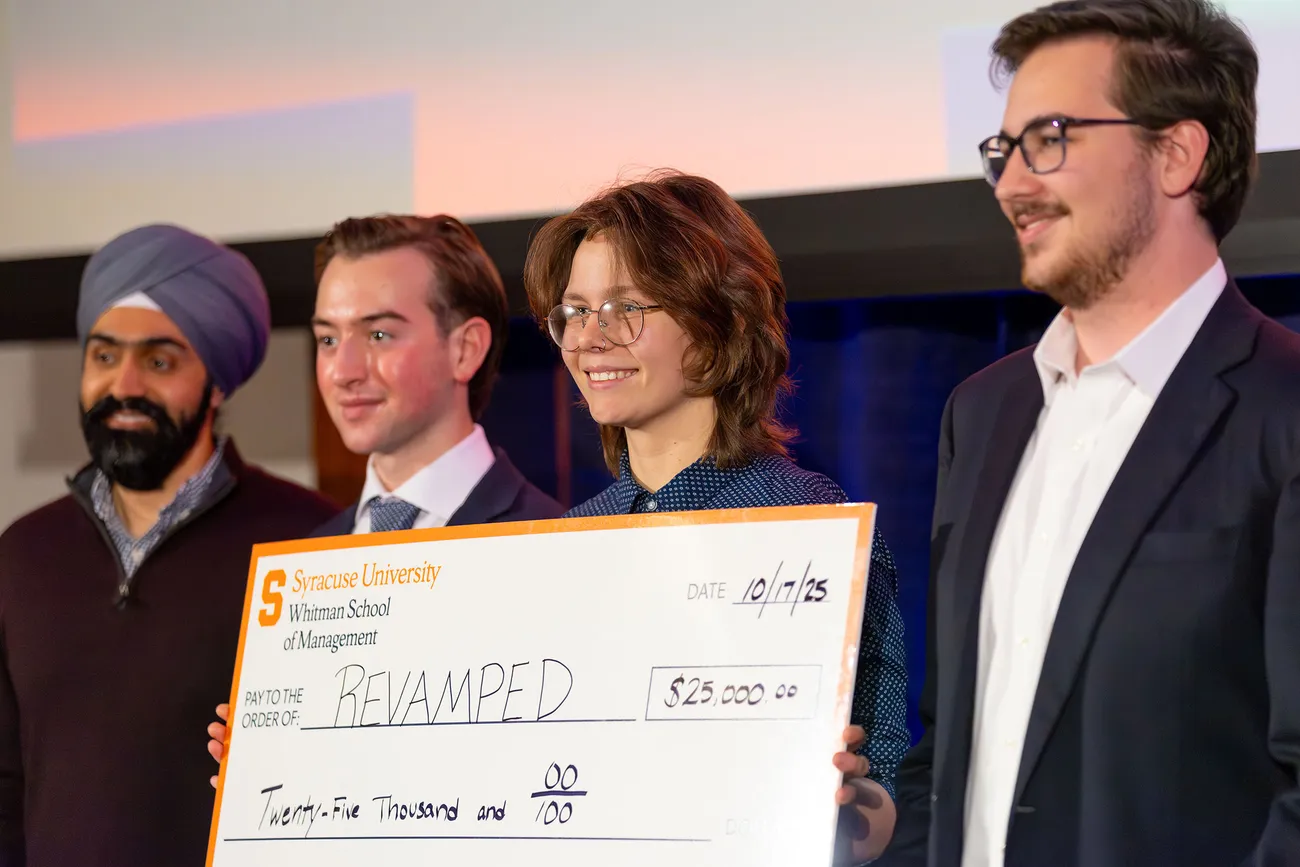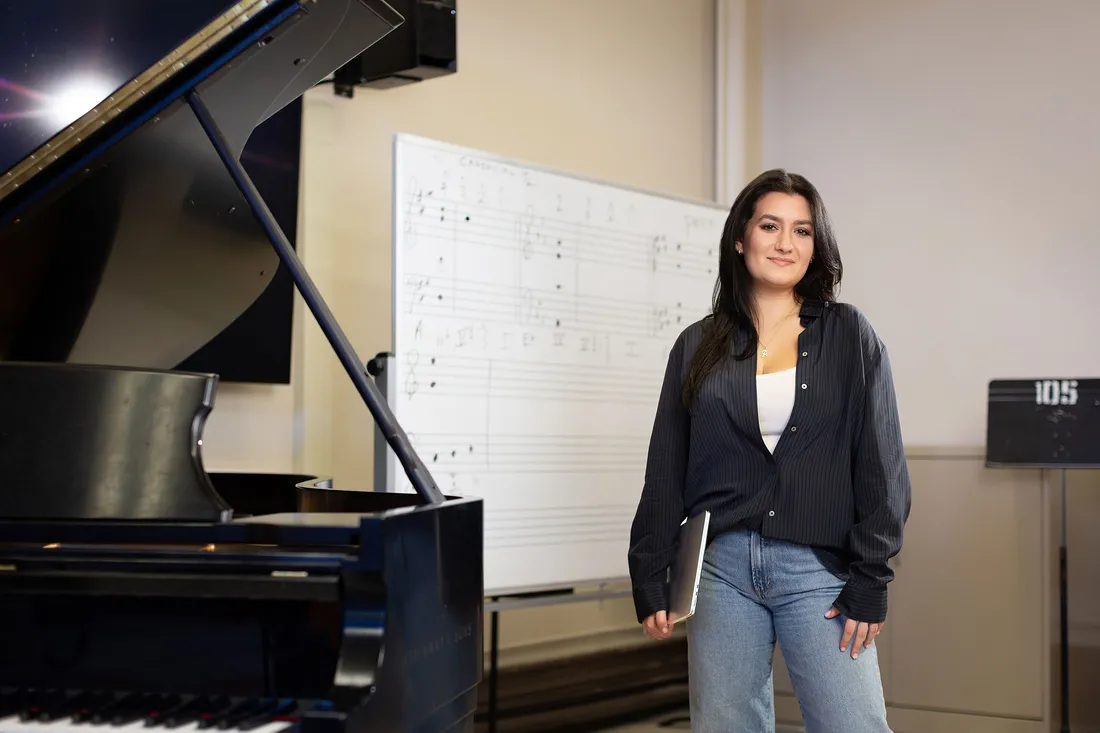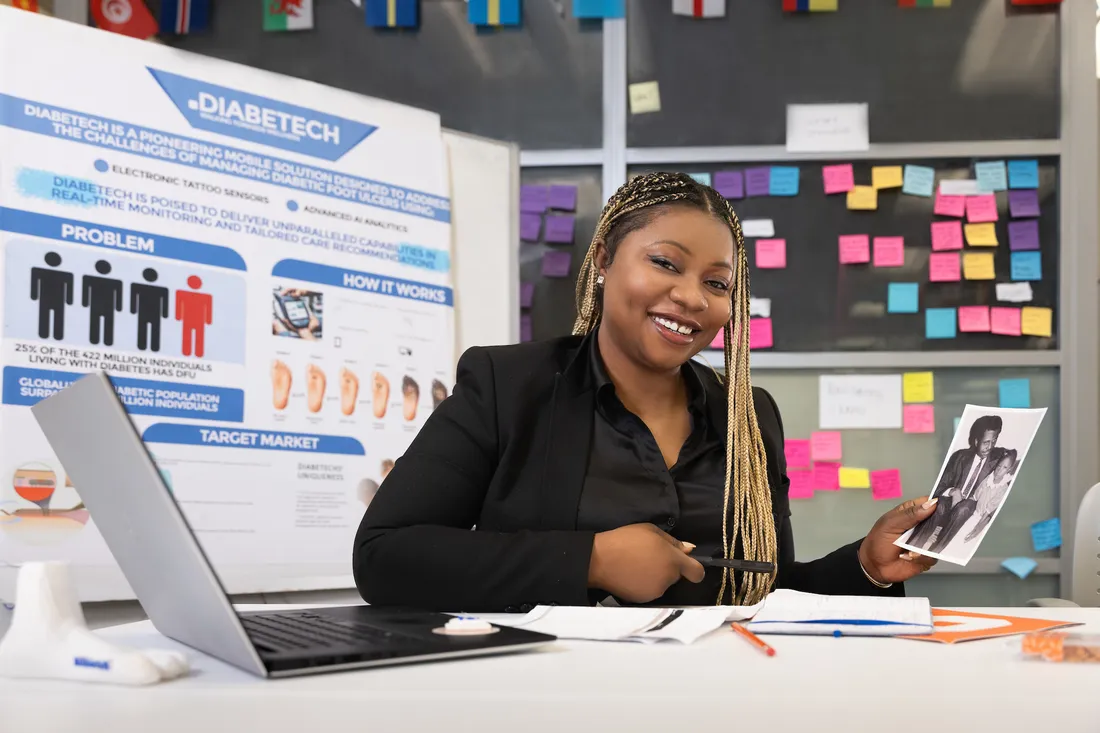Sustainability is a lifelong passion for Ava Lubkemann ’27, a student entrepreneur who blends profit and purpose.
Speaking before a captivated audience at Orange Central Homecoming, she explains how thrifting—a lifestyle choice instilled by her parents—has inspired her to launch a social enterprise. Her new venture, called Revamped, provides underserved communities with access to textile donations centers and affordable clothing.
“Our city lacks an accessible infrastructure for donating and buying secondhand goods,” says the environmental engineering major in the College of Engineering and Computer Science (ECS). “We’ve created a mobile storefront out of an upcycled school bus that goes almost anywhere.”
I’ve judged a lot of competitions, and Syracuse’s students are among the most prepared. They’re very professional.
Savneet Singh, president and CEO of PAR Technology
Lubkemann’s presentation is part of Orange Tank, an annual pitch competition organized by the Martin J. Whitman School of Management. She is one of four finalists from a pool of 50-plus applicants, seeking to turn a dream into reality.
For the occasion, Lender Auditorium in the Whitman School Building has been transformed into a Shark Tank-like set. Everything is created for effect, down to the onstage judge seating and professional lighting.
Lubkemann’s five-minute pitch is airtight. Afterward, she fields questions from a star-studded panel of judges: Jeff Knauss, a self-proclaimed “serial entrepreneur” and AI strategist; Savneet Singh, president and CEO of PAR Technology, a global leader in restaurant technology; and Stacey Tank ’02, a Fortune 500 veteran-turned-CEO and owner of Bespoke Beauty Brands.
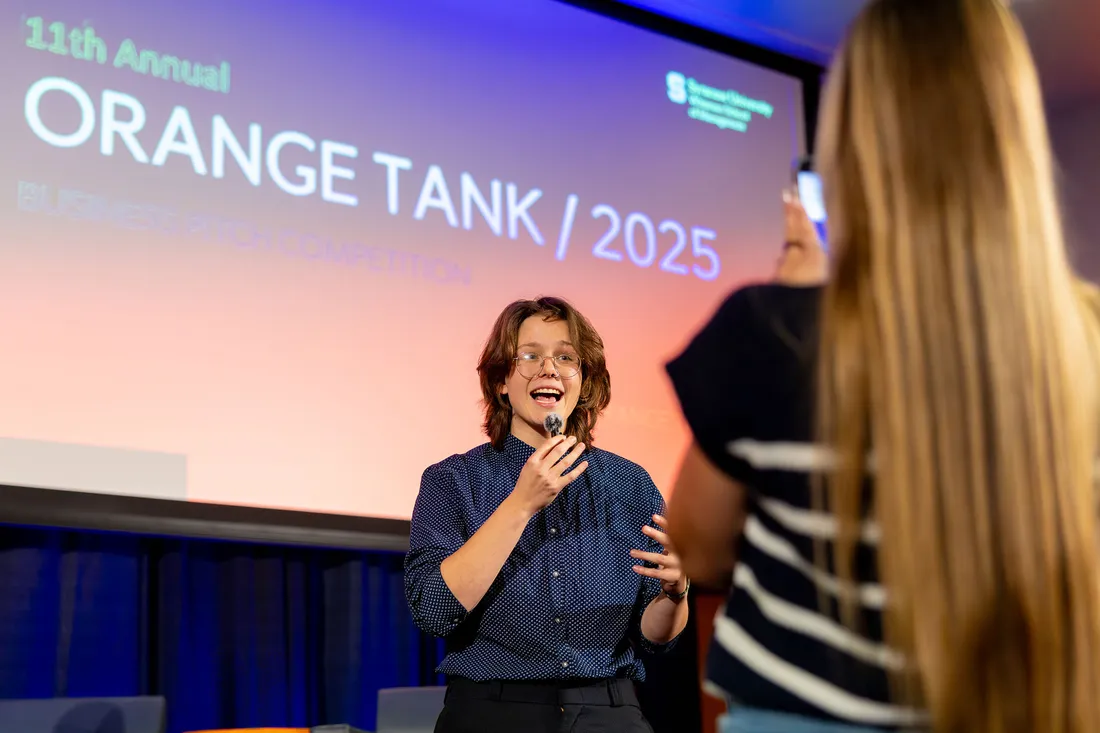
Ava Lubkemann ’27 is the founder and CEO of Revamped, which gives underserved communities access to textile donations centers and affordable clothing. She won Orange Tank’s $25,000, first-place prize.
“Revamped is a business and a movement,” says Lubkemann, noting that the average college student annually generates more than 640 pounds of trash, 20% of which are textiles and clothing. “Sustainability drives economic vitality and environmental resilience.”
Unlike a linear supply chain that ends with disposal, hers is an eco-friendly, closed looped model. Revenue comes mainly from retail sales as well as textile pickup and diversion services.
Lubkemann is rendered speechless when, at the close of the program, she’s presented with a giant cardboard check for $25,000. The grand prize will enable her to lease a workspace and textile recycling equipment, acquire a second mobile storefront, and expand her business into other urban and college markets.
When asked what it’s like to win it all, she pauses and then ekes out a single word: “Unreal.”
An Entrepreneurial Ecosystem
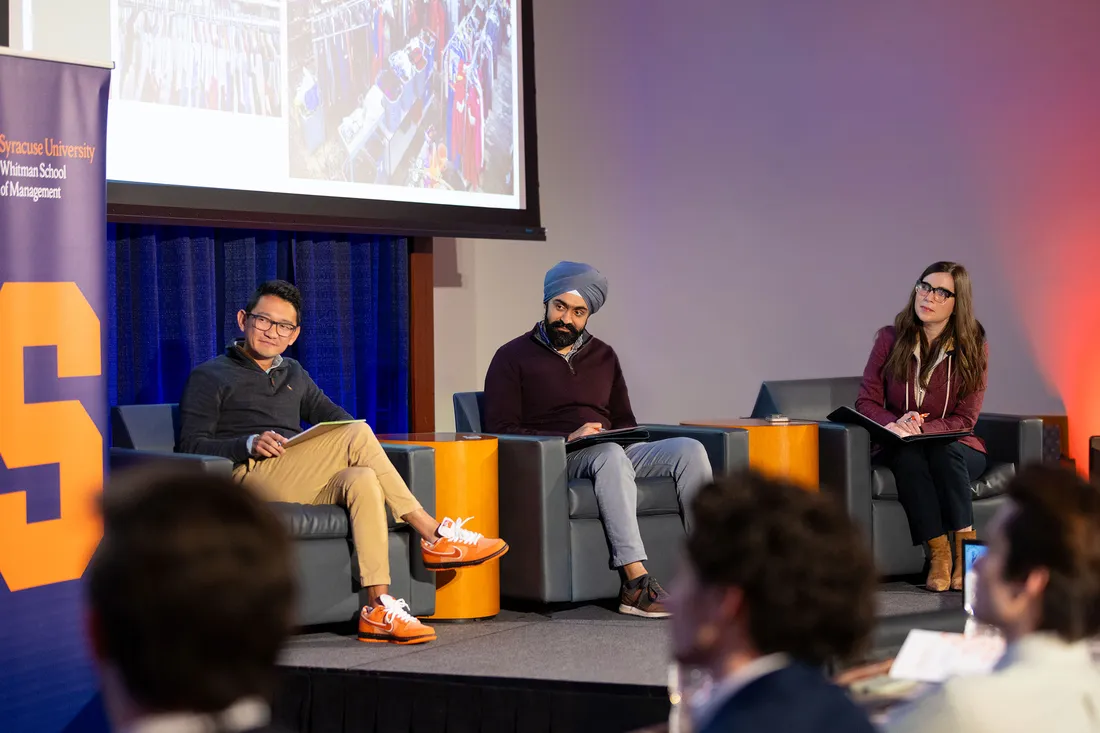
“You miss 100% of the shots you don’t take,” says Stacey Tank ’02, evoking comparisons between entrepreneurship and hockey. She’s shown here with fellow judges (from left) Jeff Knauss and Savneet Singh.
For the past 11 years, Orange Tank has been helping visionaries like Lubkemann scale pitches into businesses. The event runs on donor support, namely gifts to the Entrepreneurship and Emerging Enterprises Fund, the Scrub Daddy Entrepreneurship Fund and the Whitman Dean’s Fund.
Some contestants are regulars, proving that learning is an ever-evolving process.
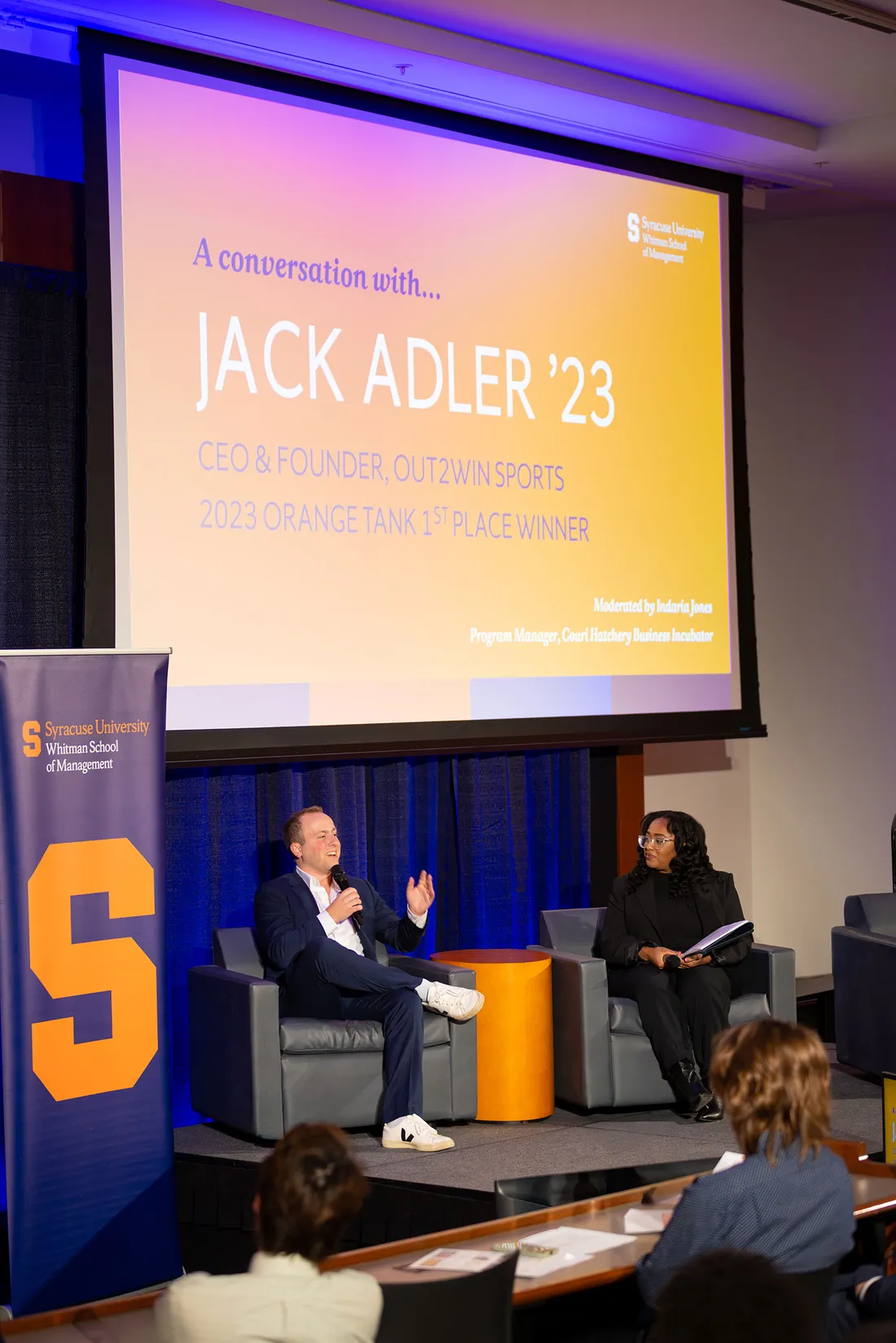
Host Jack Adler ’23 in conversation with Couri Hatchery Program Manager Indaria Jones ’14.
Emcee Jack Adler ’23 respectively placed third and second in Orange Tank before claiming the top prize two years ago. His venture—a sports marketing agency called Out2Win—recently secured $1.3 million from 15 individual investors.
Adler praises the campus entrepreneurial ecosystem, which includes startup opportunities like the Couri Hatchery, Syracuse University Libraries’ LaunchPad and the Innovation Law Center as well as numerous pitch competitions.
Healthy competition is good for students, professors and other businesses, adds Singh, whose background includes venture capitalism and fintech.
“I’ve judged a lot of competitions, and Syracuse’s students are among the most prepared,” he observes. “They’re very professional.”
This year’s finalists have moxie—what Stacey Tank calls a “speaking-truth-to-power and failure-is-not-an option” mindset. She says that even though the landscape is littered with shuttered businesses, the key is “to not give up, to learn from your mistakes.”
Proving Their Grit
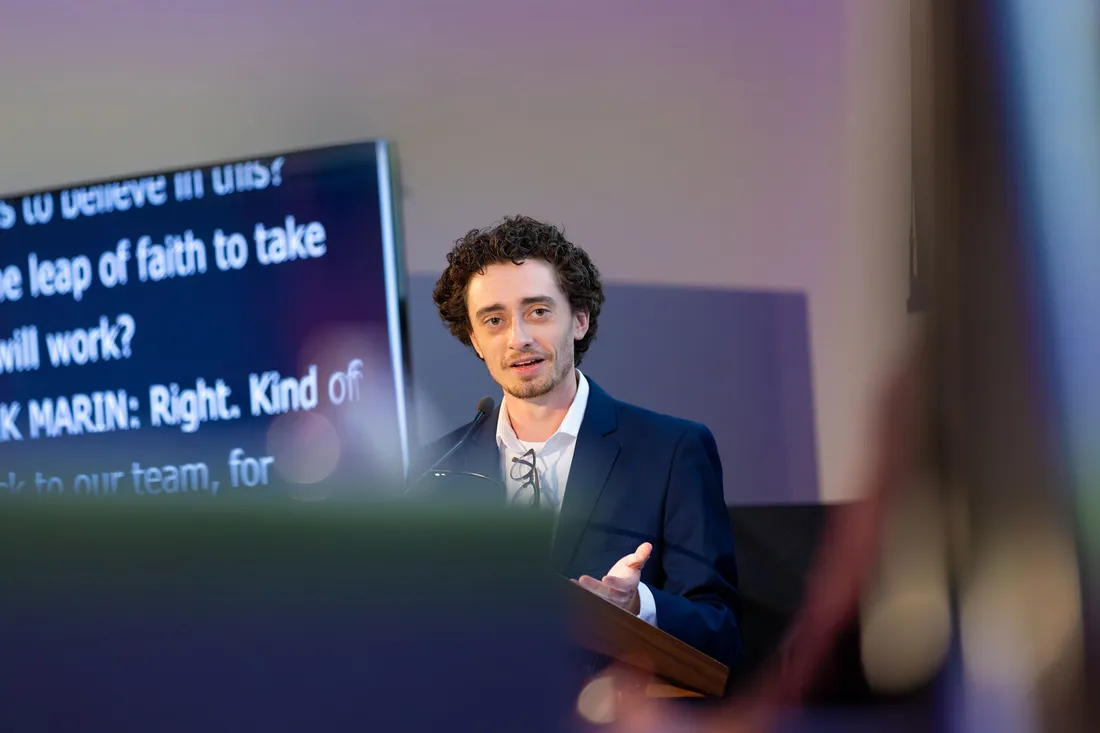
Frank Marin ’24, G’24 (above) credits LaunchPad’s Jonathan Weiss for helping him hone his startup pitch. Constructive feedback is the “fuel that keeps me going,” says Marin, who has developed a water-treatment technology that eliminates “forever chemicals.”
Frank Marin ’24, G’24, is not your typical Orange Tank entrant. The holder of an MBA from the Whitman School, he works full-time for Pratt & Whitney, a leading maker of commercial aircraft engines.
Marin also runs an orbital infrastructure and manufacturing company called Marhold Space Systems. One of their products is a water-treatment technology designed to eliminate “forever chemicals,” in addition to harmful fungi, biofilms and microbes.
“We use an advanced plasma technology to break them down without harming the environment,” says the ECS alumnus, who works out of a lab at the nearby SUNY College of Environmental Science and Forestry.
While the terrestrial applications seem vast, the device could be an asset to space missions, Marin explains, especially as organizations like the U.S. Environmental Protection Agency seek alternate ways to understand Earth’s declining health.
“We’ve gotten a lot of encouraging and realistic feedback. It’s the fuel that keeps us going,” he says.
Scaling the Future
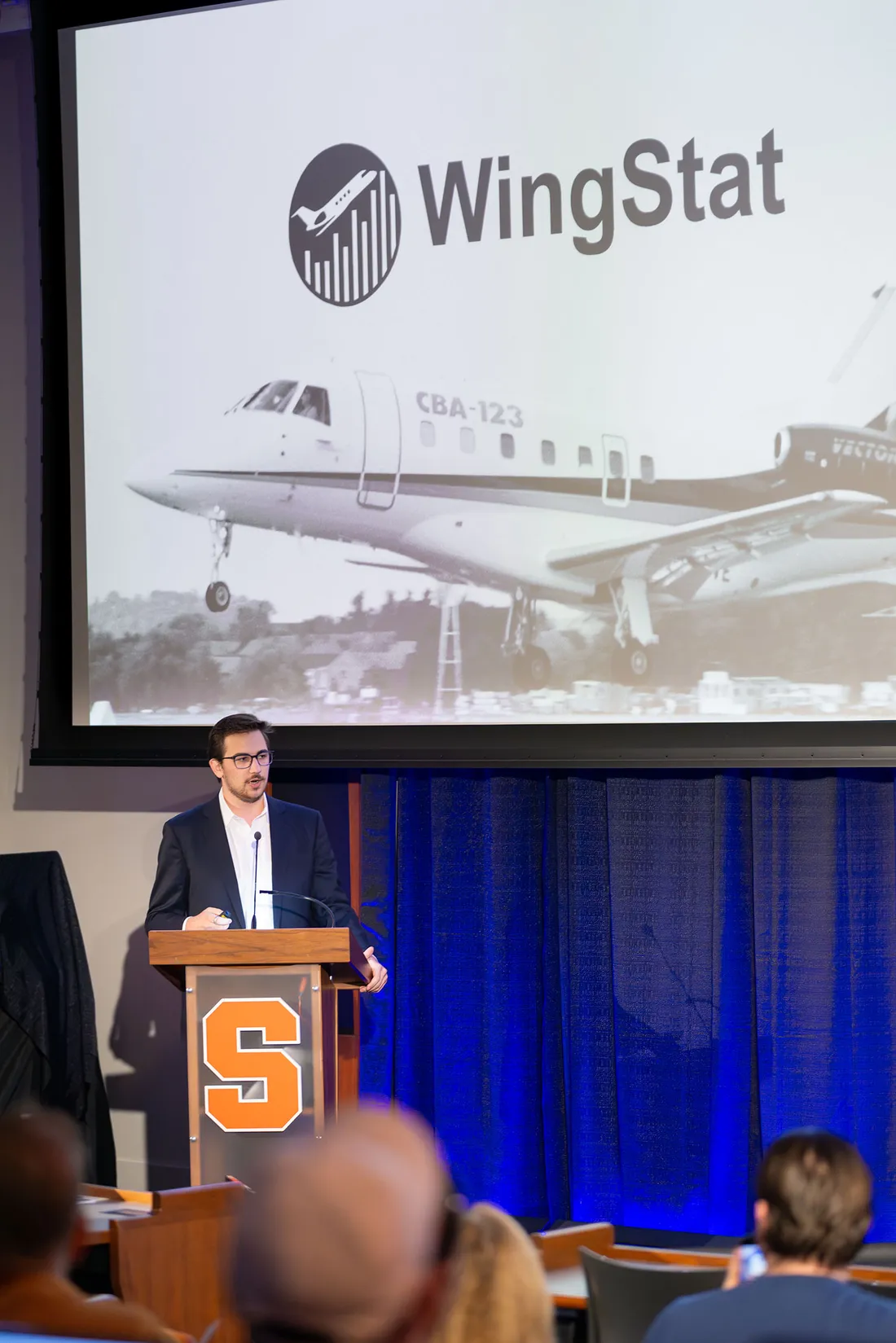
Jack Venerus ’27, Orange Tank’s second-place winner, has devised a platform called WingStat to make pre-owned aircraft sales data more transparent.
Marin is not the only finalist with his head in the clouds. Jack Venerus ’27, an applied data science major in the School of Information Studies, is a veritable “Maverick.”
While earning a private pilot license, he found that reliable aircraft sales data—particularly involving pre-owned business planes—was almost impossible to obtain.
Venerus has devised a platform called WingStat that seeks to upend the $46 billion pre-owned aircraft industry.
“We source verified data from aircraft brokerage companies and then compile it onto a data intelligence platform,” says Orange Tank’s $7,500, second-place winner. “Brokers can then track the current market value of a pre-owned aircraft without spending time and money on research.”
“It’s like Zillow for airplanes,” says Tank, adding that WingStat provides a kind of market transparency that previously hasn’t existed.
Ronan Hussar ’26, winner of the competition’s $2,500, third-place prize, also champions data accessibility. His venture, MacroFlow, capitalizes on the ubiquity of Microsoft Excel.
“Excel’s automation system is outdated, hard to learn and nearly impossible for most people to use,” grouses the dual major in finance and accounting in the Whitman School.
His solution? A novel Excel add-in that uses AI to automate repetitive tasks, like formatting reports, applying formulas and organizing data.
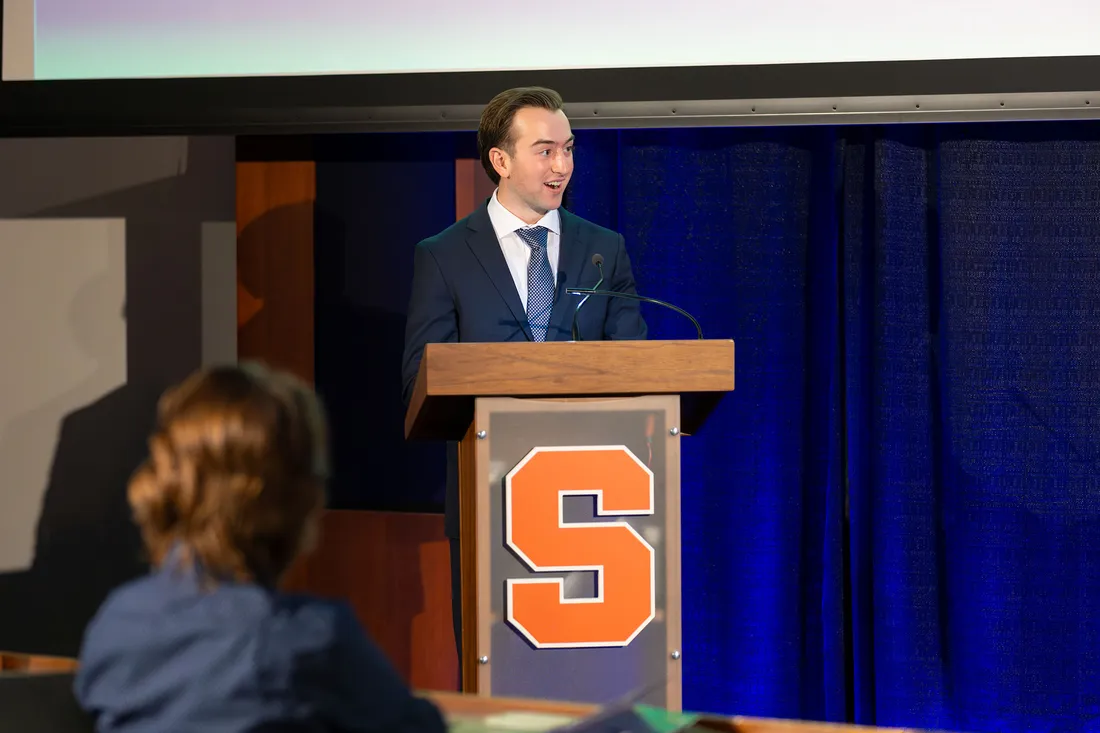
“I got to see firsthand how powerful automation can be,” says Ronan Hussar ’26, recalling an internship where his Excel add-in, MarcoFlow, was adopted. He was Orange Tank’s third-place winner.
He came up with the idea while interning at a major accounting firm. “I built an Excel macro [a series of commands] that was adopted across multiple offices,” he says. “I got to see firsthand how powerful automation can be, even when used by people who don’t fully understand how it works.”
Just as MacroFlow promises to “supercharge the work of professionals,” Orange Tank aims to help students like Hussar scale their operations.
Says Knauss: “Syracuse supports students willing to take the most important step in starting a business—the first one.”

